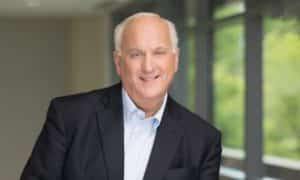Tom Grape
Chairman and CEO, Benchmark Senior Living
Age: 63
Industry experience: 35 years
Art galleries, Bocce courts and farm-to-table restaurants serving up produce grown on-site demonstrate how assisted-living developers are keeping pace with amenity offerings in new developments such as Benchmark Senior Living’s 97-unit Benchmark at Hanover complex, scheduled to open in September. Tom Grape founded the Waltham-based firm in 1997, and it now owns 63 properties in New York and all six New England states. As chairman of the Massachusetts Assisted Living Facilities Association and an executive at A/D/S Senior Living, Grape helped write the 1994 legislation that set uniform standards for the emerging housing model, when Massachusetts had approximately 1,000 assisted living units. The industry has since grown to more than 18,000 residences statewide as of Dec. 31, according to data from the Massachusetts Executive Office of Elder Affairs.
Q: You’ve partnered with TSOLife, a Florida tech firm, on some artificial intelligence applications. How is their product being used at Benchmark properties?
A: They’ve been pitching us and focusing on the senior living industry. It’s consistent with our desire to provide the most personalized experience for our residents. We piloted it in several communities and decided it was helping us, so we’ve since expanded it to all of our communities and it allows us to give a more personalized experience for folks which has been great. We do a recorded interview with residents, and then the artificial intelligence of TSOLife takes the keywords from the interview of their interests and history, and we get back an easy briefing that we can use from this recording. Before, we’d do all this by paper, and sometimes it was more complete than others. With a recording, we can get a lot more information. The AI allows us to get the key facts from their background and finds things we can use, such as residents with like interests or who perhaps lived in the same town earlier in their lives: people with like backgrounds and so on.
Q: Where is the highest growth potential among the various types of communities that Benchmark currently owns and operates, and are you changing how the space is allocated by types of uses?
A: The bulk of our communities are assisted living with a memory care wing, and we have some retirement care campuses. The trends in the allocation have been trending toward larger units, fewer studio apartments and more one- and two-bedrooms. We’ve been including larger wellness areas that might include massage rooms and larger areas for visiting physicians and specialists. We’ve included more variety in dining. An open kitchen is something we’re more likely to include these days.
Q: What types of criteria do you have for site selection and what are the newest communities under development?
A: We’re about to open one in Hanover in September, and just broke ground on a 10-story project in Alexandria, Virginia in early summer. It’s part of a mixed-use development. That’s a more recent trend we’re pursuing more actively. We’re starting to see it happen more in the industry and we think that’s a growing trend that we like a lot. The Hanover site is part of a retail center, so we’re looking for more opportunities that are mixed-use and we like that dynamic a lot.
Q: What are pending changes in regulations of assisted-living facilities that developers are keeping an eye on?
A: There is a change pending that I’m rooting for. Massachusetts has a little peculiarity in its regulation with assisted living that doesn’t allow nurses to do a few specific things, like give an injection if you’re a diabetic. The nurse employed by the assisted-living facility can’t put drops in your eyes or change your Band-Aid or give you an insulin shot, unlike other states we’re in. We’re trying to get that changed. Nurse are more than qualified to do these things. Families have to call in an outside nurse that they pay for, or the family has to come in and do those things which is an inconvenience.
Q: How did COVID force Benchmark to adjust its policies and operations?
A: Our first priority was the safety and well-being of our associates and families. We closed 65 of our communities in terms of admitting new residents or allowing visitors and group activities. Not everybody did that. We took the most conservative approach for five months. We felt it was the right way to keep the virus out of our communities and in retrospect, it was the right thing to do. We also were able to buy personal protective equipment, and it took a lot of scrambling, but we were able to fully supply our staff. We put together a coronavirus advisory council including a former U.S. surgeon general [Dr. Richard Carmona] and a former Massachusetts secretary of elder affairs [Dr. Alice Bonner] – a really august group of advisors – and they were able to give us advice periodically. We hired a director of infection control. We thought we reacted pretty quickly and we also did a lot proactively on the communications front. We were informing our families when anything changed, and state legislators and regulators before they even asked. More recently, we’ve talked about things like the wisdom of booster shots and what to make of the new variants, and we’ve talked about monkey pox a bit. Sometimes the advice is informed speculation because not much is known about some of these things early on.
Grape’s Five Favorite Things About the Senior Housing Industry:
- Fast-growing market for the next 30 years
- Ripe for new technology
- Needs new and creative product and service ideas
- More than just a job or career
- Touches peoples’ lives in a very personal, meaningful way





